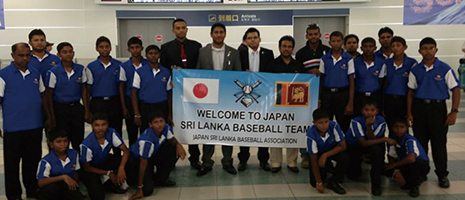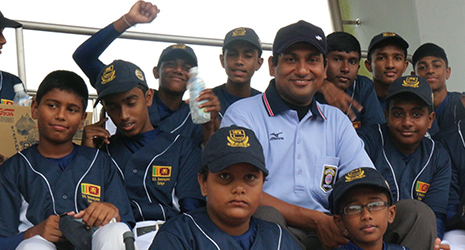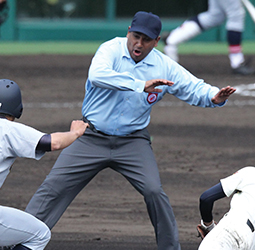Home > Highlighting JAPAN >Highlighting Japan March 2016>Home away from home
Highlighting JAPAN


Easy Call
From Sri Lanka to Japan to the world, Sujeewa Wijayanayake talks about how baseball brings people together, makes the world a better place, and has transformed his own life.
Sujeewa Wijayanayake first came to sport via cricket, a bat and ball sport that is an avid pastime in his home country of Sri Lanka. As he grew up, Sujeewa continued playing cricket but turned his attention to other pursuits as well. Baseball was not very popular in Sri Lanka, but he got the chance to play it once in high school. Although the rules were confusing at first for someone accustomed to cricket, Sujeewa quickly fell in love with the game, and his strong arm and southpaw delivery made him a natural pitcher.
A visit from a Japan International Cooperation Agency baseball coach in his senior year of high school whetted Sujeewa’s appetite to see baseball played in one of the countries that loves it best: Japan. He was the team captain that year, and after graduation he went on to coach at his high school and traveled around Asia as a Sri Lankan national player, winning an MVP award when he pitched at Baseball Clinic 2004 in Bangkok, Thailand. But Japan stayed on his mind.
Sujeewa came to Japan in 2006 to study at Ritsumeikan Asia Pacific University (APU) in Oita Prefecture. He played on the university’s baseball team, but soon began to pursue a new aspect of the sport—umpiring. “Umpires are really important to the game,” Sujeewa says. “He’s the one controlling the play. He can change everything.”
In 2009, Sujeewa began umpiring at youth baseball games, and after graduating from APU in 2010 with a degree in Asia-Pacific tourism and hospitality management, he moved up to umpiring at high school, university and club levels. By the end of 2010, he was juggling a full-time job as an area manager for a hotel chain with umpiring a hundred games a year.
He relished the challenge. “This is baseball,” he states. “Akiramenai—you can’t give up.” Sujeewa took the umpiring exams and passed, becoming the country’s only licensed non-Japanese umpire. He now holds an international umpiring qualification from the Baseball Federation of Asia as well, and stands as the world’s only international Sri Lankan umpire. In the spring of 2015, Sujeewa marked a major milestone when he umpired a game at the National High School Baseball Invitational Tournament (better known as “Spring Koshien”), a tournament that determines the nation’s top high school baseball team and one of the most popular amateur sporting events in Japan.
Sujeewa thinks the internationalism that stories like his own bring to Japan only bode well for Japan’s future, especially in light of the upcoming 2020 Olympic and Paralympic Games to be held in Tokyo. In addition to his busy schedule as an umpire in Japan, Sujeewa does a lot of international outreach. He says that baseball offers a good chance to make friends from other countries, talk with them and learn from them.
“I am standing here because of Japanese people, so in gratitude I want to give something back, to help others,” he notes. Sujeewa collects baseball equipment to ship back to Sri Lanka, conducts baseball clinics in various Asian countries, and helped build Sri Lanka’s first professional baseball field with Japanese support.
He recalls an incident that occurred while he was instructing at a clinic for representative umpires from Pakistan, Iran, India and Nepal at a seminal international event in Sri Lanka at the aforementioned stadium. At the beginning of the clinic, he says, the Indian and Pakistani umpires stayed away from one another. After a while, however, they began to mingle and compare notes.
“It was wonderful to see. Maybe the different nations’ leaders have problems that need to be resolved, but we are the same people, with the same red blood,” he recalls. “In baseball, the ball is the same. But you might have four umpires from four different countries, and two teams from different countries, meaning six different countries playing with the same ball. That’s baseball.”
Sujeewa doesn’t have a final goal in mind. Instead, he quotes a Japanese proverb: “When you climb a mountain, you can see the next mountain.” His next project is to bring an Asian tournament to the Sri Lankan baseball ground he helped build in 2012, for the benefit of the country, the region and other Asian players. He wants to change the profile of baseball in Sri Lanka and surrounding nations. “Since coming to Japan, I have changed,” he says. “And I want to make the change possible for others as well.”
© 2009 Cabinet Office, Government of Japan







